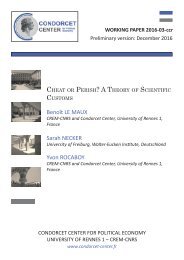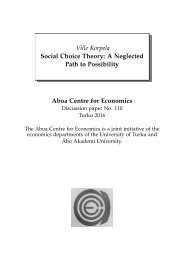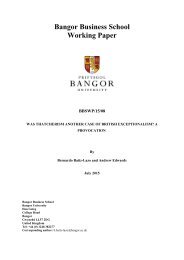MEMORANDUM
n?u=RePEc:hhs:osloec:2016_018&r=hpe
n?u=RePEc:hhs:osloec:2016_018&r=hpe
Create successful ePaper yourself
Turn your PDF publications into a flip-book with our unique Google optimized e-Paper software.
ecognized as equivalent to the Abitur required for entry at German universities. There was<br />
only one way of addressing this obstacle, namely by sitting for the required supplementary<br />
entry exam (Ergänzungsprüfung). The university allowed those without<br />
Ergänzungsprüfung to be auditors (Gasthörer). Leontief was registered as Gasthörer on<br />
27 April 1925 and retained the same status for three semesters. As Gasthörer Leontief<br />
could attend lectures but was not admitted to seminars.<br />
Soon after arrival Leontief went to see Professor Werner Sombart to introduce himself<br />
and deliver the letter from Kulisher. Sombart welcomed him and made Leontief his<br />
research assistant. Leontief liked him despite their differences in scholarly interests.<br />
Leontief passed eventually the Ergänzungsprüfung in October 1926 and was permitted<br />
to enroll as a matriculated student (mit grosser Matrikel) in the philosophical faculty. 77<br />
Sombart entrusted Leontief with being the manager of his seminars, a responsibility which<br />
also comprised admitting new participants. The seminar comprised fifteen to twenty<br />
people. Leontief recalled having admitted a number of students to Sombart’s seminar and<br />
also the many interesting discussions having taken place there. The discussions were often<br />
more on sociology than economics and Marxism was frequently brought up. 78 In retrospect<br />
Leontief remembered and summed up Sombart in the seminar as “tall, elegant… obviously<br />
originally influenced by Marx, but wrote a more or less Nazi book under the Nazis…quite<br />
eloquent and very interesting.” 79<br />
As a matriculated student Leontief worked mainly in the seminars of professors<br />
Sombart, Bortkiewicz, and Breysig. There are no records from these seminars. The three<br />
professors were rather different in scholarly terms but seem to have shared the view that<br />
Leontief was an extraordinarily gifted candidate.<br />
Werner Sombart (b.1863) had studied law and economics in Italy. His doctoral degree<br />
from Berlin University had been supervised by Gustav Schmoller and Adolph Wagner, the<br />
foremost members of the Younger Historical School. Sombart himself was denoted leader<br />
of the Youngest Historical School. Sombart was an economist and sociologist, knew<br />
Marxism well, had a radical image as a social reformer, and was very influential in social<br />
sciences in the first quarter of the twentieth century with a reputation far beyond<br />
Germany. 80 He was professor at Berlin University from 1917 to 1931 when he retired from<br />
his chair but continued to teach. Sombart was productive and wrote many books; very<br />
77 Kaliadina and Pavlova (2006, p.340n18). The Ergänzungsprüfung comprised Latin. Leontief had<br />
picked up some Latin in Petrograd and didn’t seem to have much trouble passing the exams.<br />
78 Among those Leontief admitted was Hungarian born Thomas Balogh who became a British<br />
economist and politician, and eventually member of the House of Lords.<br />
79 Alpers (1989, pp.20-21).<br />
80 A well-known statement about him is Friedrich Engels’ assertion that Sombart was the only<br />
German professor who understood Das Kapital. He denoted himself as Marxist but had no qualms<br />
about embracing National Socialism in 1934.<br />
25





